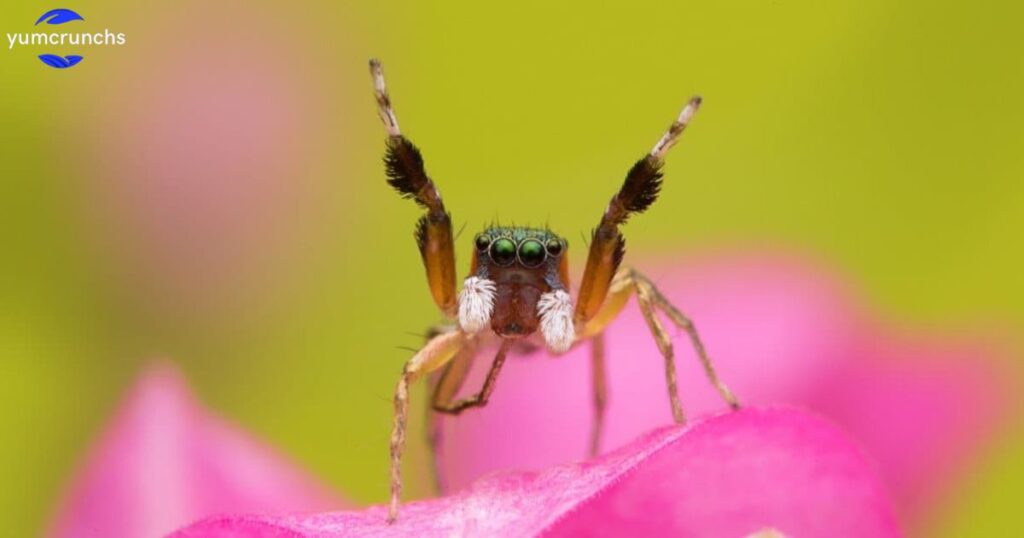Spiders, the eight-legged creatures found in homes, gardens, and forests, are fascinating beings in the animal kingdom. One intriguing aspect of their survival is their ability to endure periods without food. This article explores the question: How long can spiders live without food?
Ever wondered how these tiny creatures manage to thrive even in the absence of food? Surprisingly, spiders can go extended periods without eating. Understanding their remarkable survival strategies sheds light on their resilience in various environments, making the question of their sustenance without food an intriguing one.
While the exact duration varies among species, some Arachnids can survive for weeks or even months without a meal. This ability is due to their low metabolic rate and efficient energy storage. However, the length of time a spider can go without food ultimately depends on factors such as species, age, and environmental conditions.
How Long Can Spiders Go Without Eating Indoors
Ever wondered how long indoor spiders can survive without eating? Arachnids indoors can go without food for several weeks. Their ability to endure hunger stems from their low metabolism. Spiders store energy efficiently, enabling them to survive.
The duration without food varies based on species and conditions. Factors such as temperature and humidity influence their survival. Generally, Arachnids can go without food longer indoors than outdoors.
Other Factors Regarding Spider’s Eating Capabilities
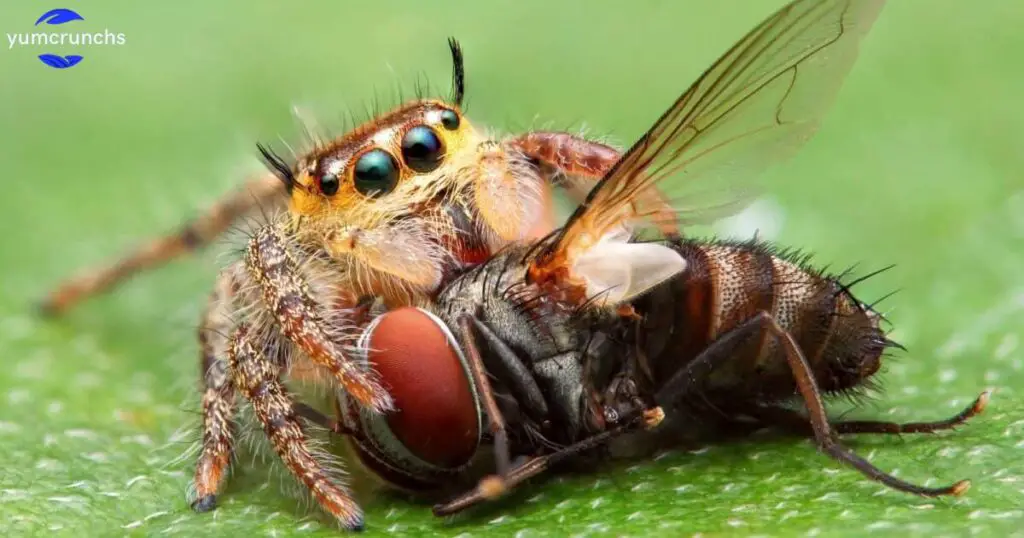
- Spider species determine how long they can go without food.
- Temperature affects a spider’s metabolic rate and feeding frequency.
- Humidity levels impact spiders’ ability to find and catch prey.
- Availability of prey in the environment affects Arachnids eating capabilities.
- Age and health of the spider influence its hunger tolerance.
- Environmental stressors may alter a spider’s feeding behavior.
- Some spiders can enter a state of hibernation to conserve energy.
What Do Spiders Eat?
Arachnids have diverse diets depending on their species and size. They primarily feast on insects and other small arthropods. Some larger spiders can even capture small vertebrates like frogs or lizards.
Insects such as flies, mosquitoes, and beetles are common spider prey. Spiders use their webs or hunting techniques to catch their food. Larger arachnids may consume prey much larger than themselves, showcasing their predatory prowess. This dietary diversity is evident in the varied diet of spiders, including household spiders. So, what do Spiders Eat – The Diet of a Common House Spider?
How Spiders Eat
Spiders eat their prey in a unique and fascinating manner. Once a spider captures its prey, it injects venom to immobilize it. This venom also helps break down the prey’s tissues, making it easier to digest.
Using specialized mouthparts called chelicerae, Arachnids then liquefy the prey’s insides. They release digestive enzymes into the prey, turning its body into a soupy substance. Finally, Arachnids suck up this liquid meal using their straw-like mouthparts, called a pedipalp, completing the feeding process. This efficient method allows spiders to extract nutrients from a wide range of prey items.
Some Species of Spiders and How Long They Can Live Without Food
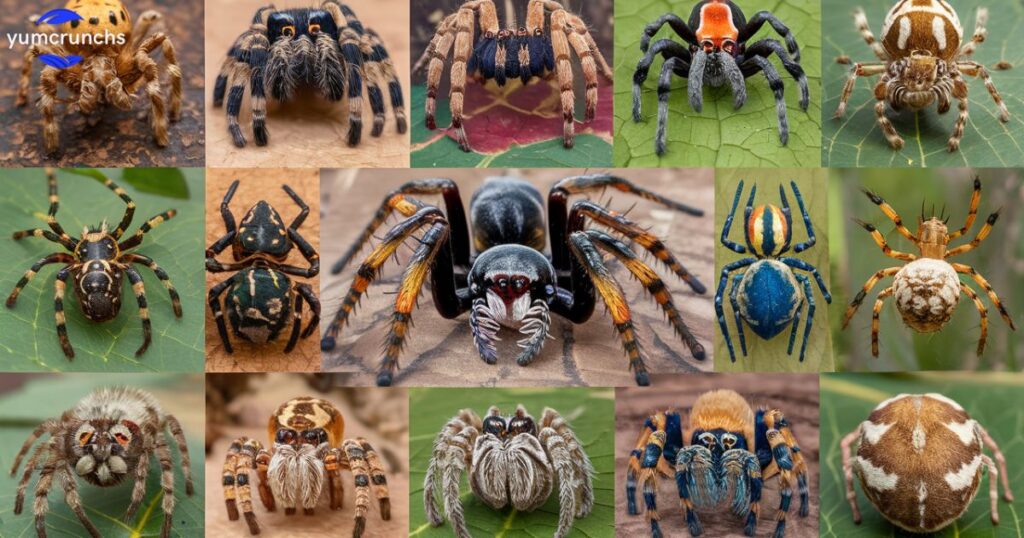
| Species | Without Food |
| Tarantula | 6 weeks |
| Jumping Spider | 2-4 weeks |
| Wolf Spider | 2-3 weeks |
| Black Widow | 1-2 months |
| Brown Recluse | 2-5 months |
| Daddy Longlegs | 3-4 weeks |
| Garden Spider | 1-2 weeks |
| Orb Weaver | 1-3 months |
| Crab Spider | 2-3 weeks |
| Fishing Spider | 3-4 weeks |
Top of Form
Bottom of Form Spiders that Are Capable of Living the Longest Without Food
Some species of Arachnids exhibit remarkable endurance when it comes to surviving without food. Among these, the brown recluse spider stands out as one of the longest survivors without food. With a low metabolism and efficient energy storage, brown recluse Arachnids can endure up to 2 to 5 months without a meal.
Similarly, black widow Arachnids are known for their ability to go without food for extended periods. These spiders can survive for about 1 to 2 months without eating. Their resilience is attributed to their ability to conserve energy and adapt to varying environmental conditions. How Long Can Roaches Live Without Food? Overall, these Arachnids demonstrate remarkable survival strategies, allowing them to thrive even in challenging circumstances.
How Long Do Spiders Live?
Arachnids lifespan varies based on species and environmental conditions. On average, most Arachnids live for about one to two years. However, some species can live much longer, spanning decades in some cases.
Factors like habitat quality, temperature, and availability of prey influence Arachnids’ longevity. In captivity, tarantulas, for instance, can live up to 20 years. Generally, Arachnids tend to have shorter lifespans in the wild compared to those in captivity.
What Are the Life Cycle Stages of a Spider?
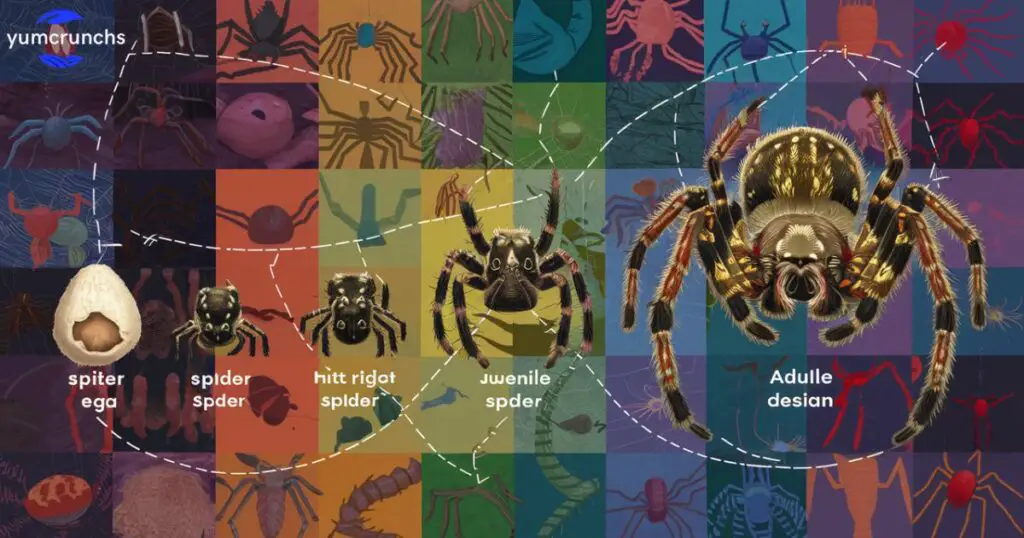
- Egg: Spider life begins as an egg, often laid in a protective sac.
- Spiderling: Hatches from the egg and resembles a miniature adult.
- Juvenile: Spider molts several times as it grows.
- Adult: Reaches sexual maturity and reproduces.
- Mating: Male and female spiders engage in courtship rituals.
- Egg sac: Female produces sac containing hundreds of eggs.
Egg Stage
During the egg stage, a spider’s life begins. Arachnids lay eggs in protective silk sacs. These sacs safeguard hundreds of spider eggs until hatching. What is The Best Way to Prevent Poor Food Safety?
Spiderlings or Juvenile Stage
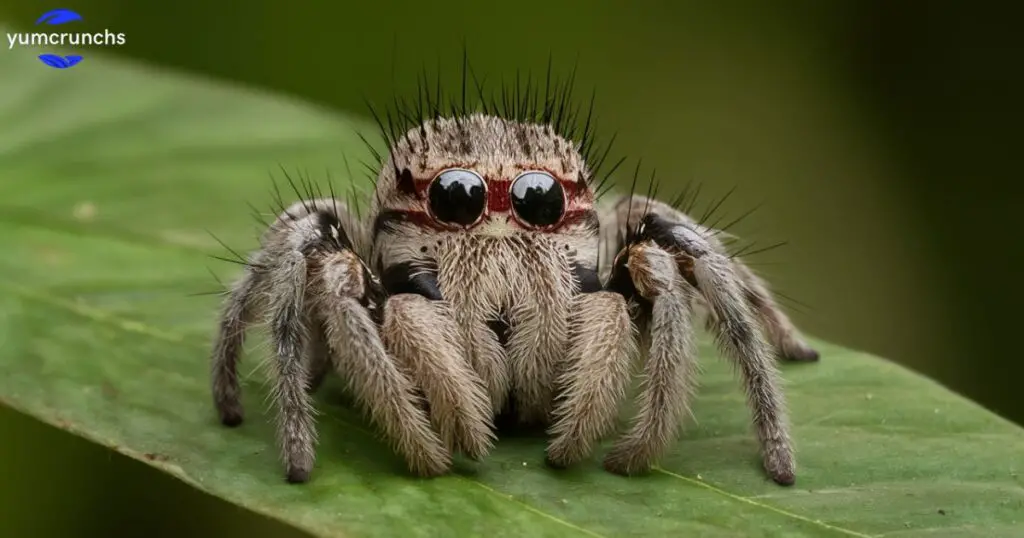
Spiderlings, also known as juveniles, emerge after hatching. They resemble miniature versions of adult spiders. During this stage, spiderlings undergo multiple molts to grow. As they molt, they shed their exoskeletons to accommodate their increasing size.
Adult Stage
The adult stage is when Arachnids reach sexual maturity. At this point, they are fully developed and capable of reproduction. Adult spiders typically engage in mating rituals to reproduce. Once they have successfully mated, the life cycle of the spider continues with the female laying eggs.
Other Recommended Maintenance
- Regular cleaning to prevent dust buildup and maintain aesthetics.
- Lubricating moving parts for smooth operation and longevity.
- Checking and tightening loose screws and bolts for safety.
- Inspecting and replacing worn-out seals to prevent leaks.
- Testing and replacing batteries in smoke detectors and carbon monoxide alarms.
- Trimming trees and bushes near the house to prevent damage.
- Cleaning gutters to prevent clogs and water damage.
- Checking and replacing HVAC filters for optimal air quality and efficiency.
Eliminating Spiders with Zunex
Eliminating spiders with Zunex is an effective solution. Zunex is a powerful insecticide spray designed to target spiders. Its potent formula quickly kills Arachnids upon contact.
To use Zunex, simply spray it directly onto Arachnids or their hiding spots. Its fast-acting formula ensures rapid spider control. Regular application of Zunex helps keep spider infestations at bay.
FAQ’s
How long does it take for Zunex to eliminate spiders?
Zunex typically kills spiders upon contact, providing rapid control.
Is Zunex safe to use indoors around pets and children?
Yes, Zunex is formulated to be safe for indoor use when applied as directed.
Does Zunex leave behind any residue or odor after application?
No, Zunex leaves no residue or lingering odor once it dries.
Conclusion
In conclusion, the longevity of spiders without food remains a fascinating topic. As we’ve explored, their ability to survive extended periods without nourishment is remarkable. From the tiny jumping spiders to the formidable tarantulas, these arachnids showcase remarkable adaptations for surviving in diverse environments.
Consider the intricate web of survival strategies Arachnids employ. How do they conserve energy? What physiological changes occur during fasting? Reflecting on these aspects, one can’t help but marvel at the resilience of these eight-legged creatures. As we delve deeper into the mysteries of nature, let’s continue to appreciate the marvels of the spider world.

Daniel, a seasoned author with 8 years of expertise in SEO, brings a delectable blend of culinary flair and digital finesse to the food niche on his website.

